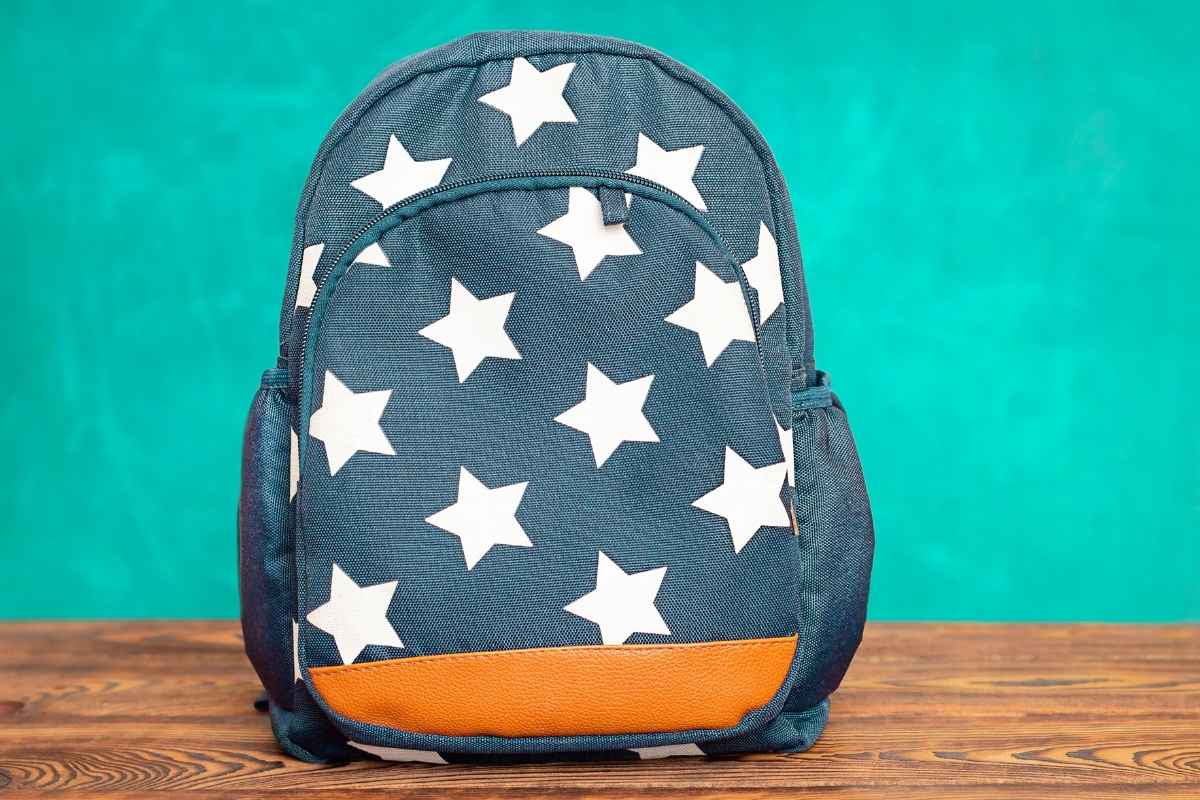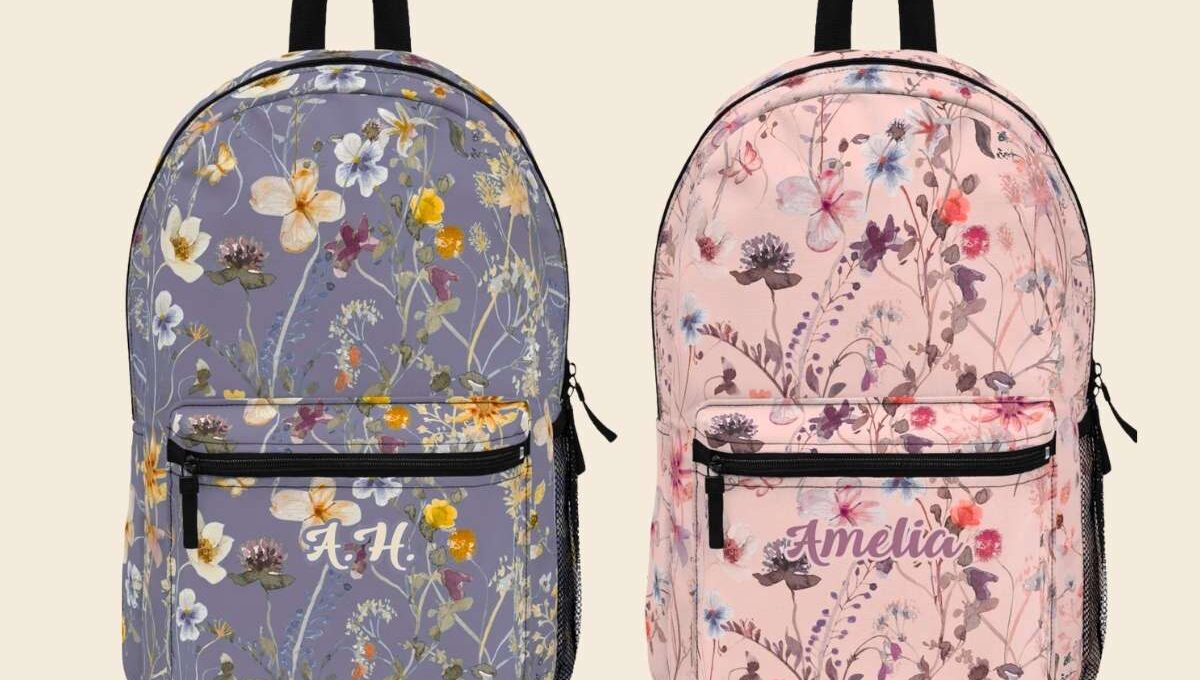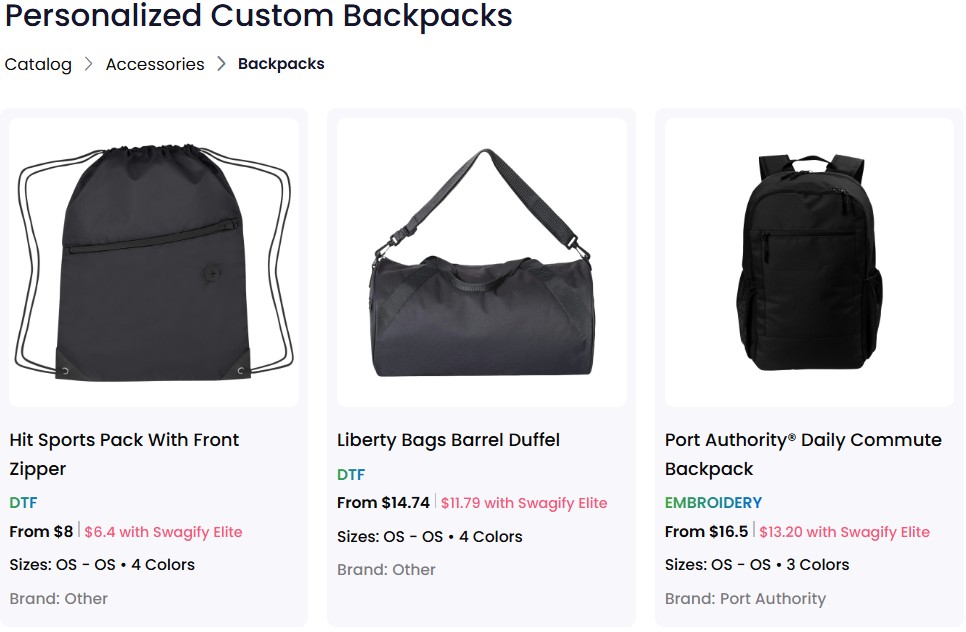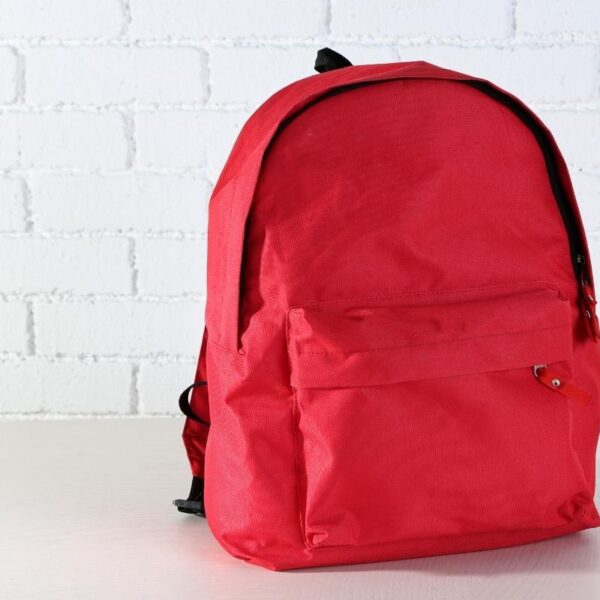Introduction
Custom laptop backpacks are more than just a fashion accessory—they’re a practical necessity for students, professionals, and travelers. As remote work and digital nomad lifestyles rise, so does the demand for stylish and functional laptop bags. With print-on-demand (POD) services, you can design and sell unique laptop backpacks without maintaining inventory, managing production, or worrying about logistics.
Table of Contents
This comprehensive guide will walk you through every step of the process, from choosing a POD platform and designing backpacks to pricing strategies and digital marketing tips that help you build a profitable business.
Step 1: Choose the Right POD Platform
Choosing the right POD service is critical for your success. The provider should offer high-quality backpacks, good customization options, and reliable shipping.
Top POD Platforms for Custom Backpacks:
- Swagify: Offers some of the best backpacks, including customizable laptop bags with various materials and sizes.
- Printful: Known for high-quality embroidery and printing. Offers premium laptop backpack options with embroidery.
- JetPrint: Ideal for bulk orders and global shipping, offering affordable base prices and custom branding options.
- Fourthwall: Great for influencers and creators, offering branded stores and product bundling.
Key Considerations:
- Material Types: Nylon, Oxford canvas, polyester.
- Laptop Compatibility: Ensure product specs list laptop size support (13″, 15″, or 17″).
- Shipping Destinations: Choose a platform that supports international delivery.
- Customization Methods: Check if embroidery, all-over printing, or patch additions are available.
Also, consider platforms that offer eco-friendly production or sustainable materials if your audience values green products.
Step 2: Design a Laptop Backpack That Stands Out
| Design Component | Options / Features | Tips for Standing Out |
|---|
| Main Purpose | Work, College, Travel, Hybrid | Define user lifestyle and design accordingly. |
| Material Choice | Vegan leather, Oxford fabric, Water-resistant polyester, Canvas | Premium materials add both function and style. |
| Laptop Compartment | Padded sleeve, Shockproof base, Side-loading access | Ensure it fits 13″–17″ laptops; advertise exact dimensions. |
| Exterior Design | Sleek & minimal, Two-tone, Tech-inspired, Street-style | Bold zippers, diagonal cuts, and color blocking can catch attention. |
| Customization Options | Embroidered initials, Patch space, Printed logos | Allow buyers to personalize for gifting or branding. |
| Color Palette | Black, Grey, Navy, Olive, Burgundy, Custom dual tones | Offer both safe and bold options; matte finishes feel more premium. |
| Ergonomic Features | Padded straps, Breathable back panel, Chest strap | Highlight comfort for commuters and travelers. |
| Tech Add-ons | USB port, Anti-theft zipper, RFID pocket | These are high-value features for modern professionals. |
| Interior Layout | Laptop sleeve, Tablet holder, Stationery organizer, Hidden pocket | Show an organized layout in your product photos. |
| Expandable Sections | Zip-out expansion panel, Roll-top closure | Adds versatility for short trips or added gear. |
| Branding Options | Woven tag, Embossed logo, Reflective print | Subtle branding can feel high-end; reflective adds safety at night. |
| Water Resistance | Coated fabric, Waterproof zippers | Mention these features clearly; ideal for students or bike commuters. |
| Sustainability Angle | Recycled materials, Eco-friendly dyes, Minimal packaging | Appeals to eco-conscious consumers — add badges or tags if certified. |
| Design Preview | 3D mockup tool, Lifestyle images | Show bag in real use — office, campus, and travel settings. |
Your design is what makes your backpack brand memorable. It must be visually appealing, relevant to your target audience, and tailored to backpack-specific printing dimensions.
Design Creation Tools:
- Canva Pro: User-friendly with lots of templates.
- Adobe Illustrator or Photoshop: Best for advanced graphic designers.
- POD Platform Editors: Many platforms offer built-in design tools and AI-powered generators.
- Procreate or Affinity Designer: Great for hand-drawn or digital art designs.
Popular Design Ideas:
- Minimalist geometric patterns
- Nature or travel-themed illustrations
- College logos or motivational text
- Gamer, anime, or pop culture references
- Personalized name, initials, or company branding
Design Tips:
- Use high-resolution files (300 DPI+)
- Use PNG format with a transparent background
- Ensure readability and design visibility from afar
- Avoid placing key elements near zippers or seams
Customization Options:
- Front Panel: Best for primary branding.
- Side Pockets: Great for small accents or logos.
- Straps: Add your brand or motivational text.
- Embroidery: Offers a premium, durable finish.
Don’t forget about seasonal or limited-edition designs to create urgency and keep your catalog fresh.
Step 3: Set Up Your Online Store

Your online storefront is where you showcase your products and convert visitors into buyers. Choose a platform based on your technical skill level, budget, and long-term branding goals.
Best Storefront Options:
- Etsy: Ideal for targeting handmade or personalized product buyers.
- Shopify: Fully customizable and scalable with excellent POD integrations.
- Amazon Handmade: Great for tapping into a high-traffic marketplace.
- Wix or Squarespace: Good for beginners who need drag-and-drop simplicity.
Essential Store Setup Tasks:
- Connect your POD account for auto-fulfillment
- Set up payment gateways (Stripe, PayPal, etc.)
- Add a custom domain for branding
- Create essential pages: About, FAQ, Shipping Policy, Return Policy
Add apps or plugins for SEO optimization, customer reviews, and analytics tracking to improve your store’s performance.
Also, consider branding elements like a strong logo, color palette, and consistent visual language across your store.
Step 4: Optimize Product Listings for Conversions
| Element | Optimization Strategy | Why It Matters |
|---|---|---|
| Product Title | Use primary keywords + clear product type (e.g., “Custom Laptop Backpack – Waterproof”) | Helps improve search visibility and instantly tells buyers what you’re selling. |
| Main Image | High-resolution, white background, product-centered | First impression counts — clean visuals build trust and attract clicks. |
| Additional Images | Include lifestyle shots, close-ups, sizing guide, and features | Builds emotional appeal and showcases usability. |
| Bullet Points / Features | Highlight 4–5 key features like material, dimensions, benefits | Make them scannable and benefit-focused, not just technical. |
| Product Description | Write in persuasive, brand-aligned language with emotional triggers | Helps convert visitors who scroll further to learn more. |
| Keywords (SEO) | Add relevant long-tail keywords, synonyms, and user search terms | Boosts discoverability on search engines and internal site searches. |
| Pricing Strategy | Competitive pricing with psychological triggers (e.g., $49.99 instead of $50) | Perceived value vs. cost can make or break conversions. |
| Shipping Info | Clearly show estimated delivery time, cost, and return policy | Reduces friction and cart abandonment. |
| Social Proof | Showcase reviews, ratings, user photos, or testimonials | Builds credibility and confidence in product quality. |
| Urgency & Scarcity | Add timers, stock limits, “only X left” alerts | Encourages quicker decision-making and reduces hesitation. |
| Call-to-Action (CTA) | Use strong CTAs like “Buy Now,” “Customize Yours Today” | Tells the buyer exactly what to do next, increasing click-through rates. |
| Mobile Optimization | Ensure listings look good and load fast on smartphones | Majority of users shop via mobile — poor experience lowers conversions. |
| A+ Content (if available) | Use enhanced content blocks with comparison charts, banners, and rich text | Gives a premium feel and increases time spent on listing. |
Your product listings need to be optimized for both search engines and customers. Use targeted keywords, persuasive descriptions, and high-quality visuals.
SEO-Optimized Title Examples:
- “Custom Laptop Backpack for Students with Personalized Name”
- “Water-Resistant Laptop Bag for Work – Unique All-Over Print Design”
Product Description Template:
- Intro Sentence: Hook readers with the main benefit.
- Materials: Detail durability, waterproof features, and internal compartments.
- Laptop Compatibility: Clearly state which laptop sizes fit.
- Customization: Explain design options and personalization.
- Use Cases: Ideal for school, work, travel, or gifting.
Visuals:
- Upload mockups showing multiple angles
- Include lifestyle images with models using the backpacks
- If possible, add a product video (30-60 sec)
- Use GIFs to highlight design transformations or features like USB ports or hidden pockets
Also, add customer-generated content (UGC) if available to increase trust and authenticity.
Incorporating trust signals like product ratings, badges, or guarantees can also boost conversions significantly.
Step 5: Price Your Custom Backpacks for Profit

Pricing is crucial for your brand’s positioning and profitability. You need to cover your costs while offering competitive prices.
Pricing Strategy:
- Base Costs: Most POD backpacks range from $20 to $35 depending on customization.
- Standard Retail Price: $40–$60
- Premium Price (embroidered or niche designs): $60–$90
Profit Margin Calculation:
- Example: $25 base cost + $10 shipping = $35 total cost
- Selling price = $50
- Profit = $15 per unit (43% markup)
Tips:
- Bundle backpacks with matching pouches or accessories
- Offer quantity discounts or seasonal promotions
- Include free shipping in price to improve conversions
- Offer upsells like name tags, matching lunch bags, or cable organizers
- Create tiered pricing for different designs or sizes
Make sure to analyze your competitors and adjust your pricing strategy based on market demand and audience expectations.
Step 6: Promote and Market Your Backpacks
| Marketing Channel | Strategy | Tips for Effectiveness |
|---|---|---|
| Social Media Marketing | Use Instagram Reels, Facebook Ads, Pinterest Pins, and TikTok videos | Showcase backpacks in lifestyle settings; use hashtags like #CustomBackpack |
| Influencer Partnerships | Collaborate with travel bloggers, students, or fashion influencers | Micro-influencers often give better ROI with a niche audience |
| Email Campaigns | Send product highlights, discounts, and reviews | Personalize with name, showcase new arrivals, and use clear CTAs |
| SEO & Blogging | Write blog posts like “Best Backpacks for College 2025” | Use long-tail keywords like “custom school bags with laptop compartments” |
| Google & Meta Ads | Run ads targeting interests like hiking, school supplies, or tech gear | Use retargeting ads to re-engage visitors who didn’t purchase |
| Giveaways & Contests | Host “Win a Free Custom Backpack” campaigns on Instagram | Encourage tagging friends and sharing for better reach |
| Affiliate Marketing | Partner with bloggers or YouTubers to promote your backpacks for commission | Use trackable affiliate links and provide marketing assets |
| Video Marketing | Create YouTube Shorts or reels showing durability, customization process | Highlight product USPs: waterproofing, storage capacity, personalization |
| Packaging Experience | Use branded, eco-friendly packaging with thank-you cards | Encourages unboxing shares and strengthens brand recall |
| Loyalty Programs | Offer discounts or early access to returning customers | Build long-term customer relationships |
| Pop-Ups & Local Events | Attend college fairs, hiking expos, or local markets | Use QR codes on banners to drive traffic to your website |
| PR and Media Outreach | Pitch your story to lifestyle magazines or online gift guides | Share your “why” — custom, handmade, sustainable, or unique design angle |
| Referral Programs | Reward customers for referring friends | “Give $10, Get $10” style incentives work well |
Even the best product won’t sell without proper marketing. Use both organic and paid strategies to drive traffic to your store.
Organic Marketing:
- SEO Blog Posts: Write blog content targeting keywords like “best backpacks for college,” “custom laptop bags,” etc.
- Pinterest: Post lifestyle pins linking back to your product page
- Instagram Reels & Stories: Show behind-the-scenes design or unboxing
- TikTok: Showcase trendy designs and how your backpack stands out
- Email Marketing: Build a list and send new arrivals, sales, and storytelling emails
Paid Marketing:
- Meta Ads (Facebook/Instagram): Target demographics like students, tech workers, or travelers
- Google Shopping Ads: Appear directly in search results
- Etsy Ads: Boost visibility within Etsy search
Influencer Marketing:
- Partner with micro-influencers (5K–50K followers) to review or unbox your backpack
- Offer affiliate commissions to encourage promotion
- Send PR packages to YouTubers or TikTokers in the lifestyle niche
- Run giveaways to increase reach and engagement
Use tracking links and coupon codes to measure the success of each channel and adjust your strategy accordingly.
Step 7: Manage Fulfillment and Provide Excellent Customer Service
Your POD provider handles manufacturing and shipping, but it’s your job to ensure your customers have a smooth experience.
Key Responsibilities:
- Respond to queries promptly (within 24 hours)
- Track orders and update customers
- Handle refunds or replacements through the POD platform
- Collect reviews and display them on your store
- Monitor customer feedback to identify areas for improvement
Tools That Help:
- Order Tracking Pages (available on Shopify/Etsy)
- Chatbots for FAQs
- Review Apps like Loox, Judge.me, or Etsy Reviews
- CRM Tools like Klaviyo or Omnisend for customer retention
Go the extra mile with thank-you cards, packaging notes, or loyalty discounts to increase repeat purchases.
Implement post-purchase emails that ask for reviews, suggest similar products, or offer a discount on the next purchase.
Conclusion
Selling custom laptop backpacks through POD is an exciting opportunity for creative entrepreneurs. You don’t need upfront capital or inventory space—just creativity, a reliable POD partner, and a strong marketing plan.
By focusing on quality design, optimized listings, and effective promotion, you can build a profitable brand that stands out in the competitive accessories market. Whether you’re an artist, influencer, or e-commerce beginner, custom backpacks offer a versatile, high-demand product that fits many niches.
Take advantage of social commerce, storytelling, and strategic branding to grow sustainably. Track your analytics, listen to customer feedback, and keep innovating.
Start today—design your backpack, choose your platform, and share your creativity with the world. Your brand journey begins with a single design.





Sign up